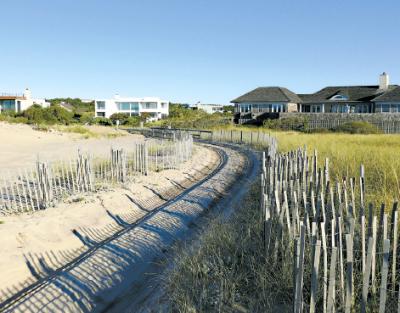Beach Driving Lawsuit to Head to Trial

A judge has cleared the way for a trial in Suffolk Supreme Court on intertwined lawsuits from Napeague property owners seeking to ban all but emergency vehicles from the ocean beach in front of their residences and claiming private ownership of the beach.
The East Hampton Town Board and the town trustees had sought summary judgment in the suit, hoping the claims would be rejected and there would be no trial. While the decision left what town officials said was a ray of hope, the important question of whether summer four-wheeled visitors interfere with the property owners’ right to use and enjoy their own houses and grounds was not answered. No date for the trial has been set.
East Hampton Town Trustee Diane McNally, who is the trustees’ presiding officer, said she viewed the Sept. 3 decision by Justice Jerry Garguilo as positive.
“I’m very happy. It’s not over, but an inning,” she said.
But Stephen Angel, a lawyer who represented the various individuals and homeowners’ associations that brought the suits, said he was optimistic about the eventual outcome.
The litigation dates to 2009, when a number of homeowners’ associations and individuals, as well as the owners of the White Sands Motel, banded together to sue the town and the trustees, whose ownership of the beach on behalf of the public has been assumed for more than 300 years. Several other property owners were listed as additional defendants.
The lawsuit followed years of complaints about the use of portions of the shoreline by four-wheel-drive vehicles.
While the White Sands and several other plaintiffs on a part of beach east of Napeague State Park were mainly concerned with trucks and dogs passing in front of their properties, the group to the west of the park had other concerns.
Referred to in court papers collectively as Seaview at Amagansett, these western property owners objected to the growing use of the beach by people swimming, sunbathing, and picnicking.
As many as 200 trucks and other vehicles were parked on the sand at one time, they claimed, with as many as 600 trips a day being recorded on a nearby access at the end of Marine Boulevard in Beach Hampton.
According to the Seaview complaint, the holders of town-issued beach-vehicle permits congregate during the sum- mer months on a 4,000-foot-long section of beach. The plaintiffs allege that the visitors set up tents and grills, allow dogs to run free, and swim without lifeguard supervision. They say that speeding vehicles are a risk to residents, their employees, and guests, and that some trucks are illegally parked on beach grass, which could destabilize dunes. Also claimed is that bonfires and fireworks set off by beachgoers are a risk to upland properties.
In his decision, Justice Garguilo agreed with the White Sands plaintiffs that their properties extended to the high tide line, dismissing three points made by the trustees and town lawyers in motions seeking to have that suit thrown out.
However, the court found that the 1882 deed to roughly 1,000 acres in which the trustees sold the area to Arthur W. Benson, a 19th-century land speculator and founder of the Brooklyn Gas Light company, reserved certain rights to the townspeople as a whole that continue to the present. These assurances included landing fishing boats and the right to “spread the netts on the adjacent sands. . . .” The Benson agreement, Justice Garguilo wrote, remains binding to this day.
To be decided at trial is whether the easement described in the Benson deed has been expanded through the years to include non-fishing activities, such as swimming and bonfires. The Seaview at Amagansett group has contended that the trustees and town have “created a de facto parking lot and bathing beach on the subject property.” The plaintiffs’ lawyer, Mr. Angel of Esseks, Hefter and Angel of Riverhead, argued that the Benson deed did not cover these recreational uses. An affidavit included in the court papers from the late Milton Miller, a bayman who died in 2012 at 97, countered that people had sunbathed, swum, and picnicked there since at least the 1920s.
In the Seaview suit, Justice Garguilo upheld the trustees’ claim that they, not the plaintiffs, owned the beach in question.
Citing another recent decision in which Lloyd and Barbara Macklowe sued the trustees over a property at Georgica Beach, he wrote that the private parcels ended at a moving boundary formed by the seaward edge of the beach grass.
However, the deeds of a group of additional defendants named in that suit described their ownership as extending to the high tide line, Justice Garguilo determined.
Nonetheless, he wrote, as inheritors of the Benson easement, they did not necessarily gain the right to block recreational users from crossing their land.
Justice Garguilo also left for the trial the suits’ claims that modern use of the beach for drivers, picnickers, and others was a nuisance. He let stand as well the question of whether it discriminated against oceanfront property owners and represented a breach of duty by the trustees and town to protect the interest of landowners. Also to be decided later is the matter of the Marine Boulevard beach access.
The Seaview at Amagansett suit claims that summertime four-wheeldrive vehicle traffic over the narrow access path has expanded greatly from its former use by commercial fishing crews.
According to the suit, an easement concerning the access route through the dunes limits its use to what was taking place in 1981, when haul-seiners were “spreading their netts.” The agreement was filed with the Suffolk Clerk’s Office that year.
WITH REPORTING BY CHRISTOPHER WALSH
